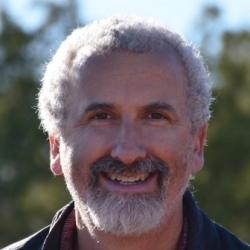
Stuart Siegel
Education
B.A. Environmental Science, UC Berkeley
B.S. Chemistry, UC Berkeley
M.A. Geography, UC Berkeley
Ph.D. Geography, UC Berkeley
Research Areas
My focus is on the science and policy intersections of climate change, ecosystem restoration, resilience, coupled human-natural systems, and regional land use planning. My work is primarily in estuarine and coastal tidal wetlands and lagoons, their associated ecosystem complexes, and the adjacent human landscapes protected by these natural systems. My geographic focus is mostly the San Francisco Estuary, with international collaborations including comparative geographic studies.
My research interests are twofold. First is around restoring wetlands functions and services in the contexts of climate change effects, mitigation, adaptation, and within estuarine “living shorelines”. Wetland functions and services are intimately linked to hydrology and salinity, both of which climate change will alter, and they are linked to land use practices and their human influences. Long-term studies are effective in elucidating functional changes which in turn can help proscribe restoration and conservation efforts. Wetlands also can be components of living shorelines, integrating ecological functions and ecosystem services across subtidal eelgrass and oyster reefs to sand and gravel “beaches”, across wetlands, and into wetland/upland transition zones and associated sea level rise accommodation space. Second is to advance ecosystem restoration design efficiency, planning, and outcomes assessment, folded within a strong adaptive management framework. I have worked for years with the former CALFED and current Delta Science Program to help develop many related concepts. My research interests are in how to guide the adaptive management process meaningfully and cost effectively. These efforts can include bringing “lessons learned” to bear, cost-effective assessment methodologies, systematic integrative synthesis, regional assessment strategies, and the incorporation of outcomes into effective governance structures.